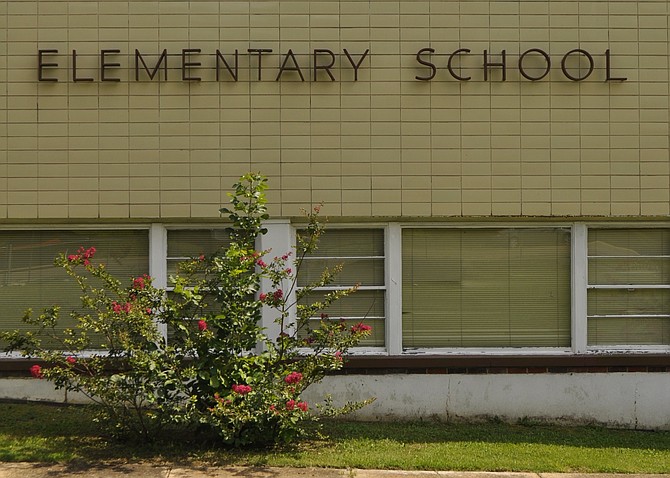School districts have tried to make up the gap by raising local property taxes. From 2008 to 2013, local property tax collections rose by $232 million. Photo by Trip Burns.
DURANT, Miss. (AP) — In a state with a long history of lousy education, and a bad habit of not paying for it, nowhere is the problem as profound as in this tiny town smack in the middle of Mississippi.
Durant Public School teachers spend their nights searching for math and other problems on the Internet because the school can't afford up-to-date textbooks. School leaders can't pay for reading coaches.
There's a leaky roof and crumbling ceiling tiles, no marching band and no advanced placement classes to help raise the district's "D'' academic rating. To save money, the number of teachers and their assistants were reduced and administrators took pay cuts.
The troubles in this town of 2,700, where the closest Wal-Mart is about 20 miles away, illustrate the pressures across Mississippi. Since 2008, legislators have ignored a state law and spent $1.5 billion less on education than what's required. The cuts are among the deepest in the nation.
In response, about 80 percent of Mississippi's 146 school districts have raised property taxes since 2008, the last time lawmakers provided full funding under the state formula, according to an Associated Press review. By law, some districts can't raise property taxes any higher to fund operations, leaving them even more dependent on state money.
The underfunding sparked a lawsuit this fall by districts to make the state pay what the districts say they're owed. Another group is trying to get a funding guarantee written into the state constitution in an attempt to force lawmakers to provide full funding.
In Durant, about 60 miles north of the state capital of Jackson, teacher Rebecca Austin has to photocopy handouts for her math students because the school's textbooks don't meet Common Core standards. The old books are locked away in a closet.
"I'm up to about 12:30 or 1 o'clock every night finding stuff," Austin said.
State funding was cut as tax revenues plunged during the recession, and the gap hasn't shrunk even though state revenues have recovered. Critics say instead of fully funding education, lawmakers gave large tax breaks to businesses and chose to fill the state's savings accounts. Another gap looms in the 2016 budget year. According to early estimates released Tuesday, the state could fall $280 million short again.
Across the country, state spending is lower than before the recession in 35 states, according to a recent review by the Center on Budget and Policy Priorities. Yet it hits Mississippi harder because the state's per-pupil spending levels ($7,926 in 2010-2011) were already among the nation's lowest and its percentage of students in poverty is the highest of any state.
Quality Counts, a yearly look at education in states by the trade publication Education Week, ranked Mississippi 51st in terms of student achievement in 2014, below every state and the District of Columbia. Mississippi has been ranked near the bottom in some measures since the ratings began in 1997.
In its review, the AP used data from the Mississippi Department of Education to examine taxes and spending, teacher numbers, local and state teacher pay, class sizes and advanced classes. The AP used calculations by The Parents' Campaign, an advocacy group seeking full funding, to look at underfunding by district.
Durant has 588 students in grades K-12 who attend school in one complex of buildings. Some lawmakers tried to force the district to merge last year, saying it would improve efficiency. Teachers turn over quickly here, and when the district hires replacements, it tends to choose rookies expressly because they are cheap. The state-mandated minimum pay scales rise with each year of experience.
"Our first choice is to select those people with less experience, particularly people that are right out of college," said Superintendent Louise Sanders-Tate. "I hire those teachers with zero years because it's going to help my bottom line."
To overcome that lack of experience, Sanders-Tate takes the unusual step of going into classrooms to help coach teachers. That's key because Mississippi is requiring schools to flunk third-graders who can't read at a basic level beginning this spring.
Administrators said the district chose to retain as many teaching slots as possible by forgoing new books.
"If we buy textbooks, we're not going to have the teachers," said Glenn Carlisle, a former Durant superintendent now serving as a district consultant.
Durant is violating a state law that every student have a book or electronic device to take home in every subject. State Auditor Stacey Pickering said the "vast majority" of districts aren't complying with the textbook requirement.
"They really need books," said parent Amelia Gibson, whose son Martez is a ninth-grader at Durant. "Then you can have something to go by to help them with their homework."
Like many rural districts, Durant depends on state money. In 2013, 60 percent came from the state funding formula called the Mississippi Adequate Education Program. The formula, created in 1997, was meant to help equalize funding for districts with small tax bases.
School districts have tried to make up the gap by raising local property taxes. From 2008 to 2013, local property tax collections rose by $232 million. That was enough to allow for a small increase in spending on operations, but they still fell $231 million short of inflation.
In Durant, school property tax rates rose 32 percent between 2008 and 2013. Meanwhile, the town's tax base got a lot smaller when auto parts supplier Visteon Corp. closed in 2009. Along with 150 lost jobs, tax revenue dove from $800,000 to $450,000.
About one in six districts has reached Mississippi's cap on taxes for operations such as salaries, supplies and buses, leaving few money-raising options and putting the emphasis on cuts.
"The whole time I've been superintendent, we haven't had the capacity to raise taxes," said Carrolyn Hamilton, superintendent in coastal Long Beach since 2003. "For us, we just have to cut the amount necessary to meet budget."
Hamilton said the district can't offer as many years of foreign language as before and ended seventh-grade gifted classes.
Mississippi schools cut 6 percent of the teacher force — about 2,000 teachers — from 2008 to 2013, lifting the average student-teacher ratio to 15.2 in 2013 from 14.3 in 2008. Teaching assistants, once mandatory through third grade, have become increasingly rare above kindergarten.
At Enterprise Attendance Center in Lincoln County, first-grade teacher Amy Lofton must share an assistant even as she teaches 26 students — one short of the state cap of 27.
"There's more papers to grade, more things to keep up with," said the teacher at the 840-student K-12 school south of Jackson. "The children won't get the individual attention they need if we don't have enough teachers and assistants."
Some districts cut the number of paid days for employees or cut the amount they add to teachers' salaries. More than 20 districts reduced supplements by $400 or more. Even when two years of across-the-board salary increases end in 2015, average teacher pay is likely to remain below 2008 levels after inflation.
Years of austerity have left some educators frustrated with lawmakers. Enterprise Principal Shannon Eubanks said the hundreds of millions of dollars in business tax cuts made in recent years proves Mississippi could spend more on education as leaders demand performance comparable to top states.
"We're trying to get kids educated up to a level that's comparable to Massachusetts," Eubanks said. "But we're not putting the money in."
In 2014, legislators filled the state's savings account to the legal limit of $410 million, but increased school funding by less than $10 million after teacher pay raises. Some complain districts are spending too much on administration and not enough on classrooms.
Sanders-Tate, the superintendent in Durant, dreams of raising the school's performance from a D to an A, but she knows it's a challenge.
"When you don't have what you need, you've got to make do," Sanders-Tate said. "I'm tired of making do for the kids when they deserve the best like everybody else."
Copyright Associated Press. All rights reserved. This material may not be published, broadcast, rewritten, or redistributed.



